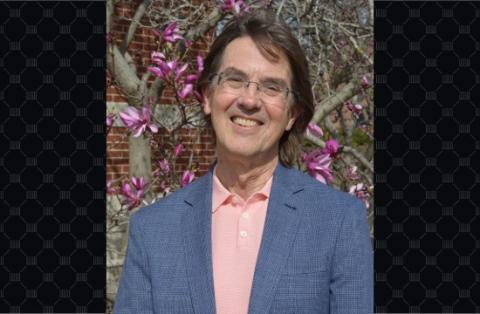The Department of Classics, Archaeology, and Religion mourns the loss of Prof. Dennis Trout, who passed away on Monday, October 6, 2025.
Prof. Trout (PhD, Duke University 1989) joined the faculty of the University of Missouri in 2000 to develop and sustain a leading position both nationally and internationally in the fields of Classics, History, Religion, and Art History. Receipt in Spring 2024 of the Andrew W. Mellon Rome Prize of the American Academy in Rome was only the climax of years of seminal, highly acclaimed, and award-winning scholarship. In 2009 he was elected to the Vice Presidency of the North American Patristics Society, a leading international academic society, and then served for two years (2010-2012) as the Society’s President. He later served on the advisory board of the Journal of Early Christian Studies and as an Associate Editor of the Journal of Late Antiquity, two of the premier journals in his field. Prior to his tenure with the University of Missouri, he spent time at Tufts University and Harvard University.
Prof. Trout was the author, co-author or editor of four books, and of about forty articles, plus an array of shorter pieces and book reviews on the Latin poetry of Late Antiquity (4th-6th centuries), especially in Italy. Each of these publications draws attention to texts and historical figures that had remained little known, analyzing their relevance to early Christian studies through an interdisciplinary approach that combines unparalleled mastery of philology, cultural anthropology, and art historical and archaeological perspectives.
His first book, on the 4th-century CE poet and churchman Paulinus of Nola, received in 2003 the major prize from the Classical Association of the Middle West and South. His second book (on the epigraphic poetic corpus of another 4th-century CE figure, Pope Damasus) has already become a classic in the fields of late ancient poetry, the early cults of the martyrs, and the monumental history of the city of Rome itself. His most recent co-authored book, on the life and cult of Emperor Constantine’s daughter, contributes to the field of women’s history and the role women played in the development of the practices of the early church. He was working on many new projects up to the time of his death, including a book titled Reimagining Rome: Emperors, Popes, and the Cult of the Saints, the first comprehensive study of the inscribed Christian poetry of late ancient and early medieval Rome, which details the transformation of the literary and epigraphic tradition as the city changed from the Roman imperial capital to the capital of European Christianity.
While ground-breaking and theoretically sophisticated, Prof. Trout’s commentaries and historical discussions – as well as the translation into English of important texts – are praised for being widely accessible to scholars and students alike, thus playing an important role in classrooms. His commitment to curricular design and focus has indeed made him a major catalyst in the changes of the Honors College Humanities Sequence and the very birth of the Center for Humanities at the University of Missouri.
Prof. Trout taught courses at every level (from elementary Latin to graduate seminars) and directed eight PhD dissertations. He also served as Adjunct Professor in the Department of History. He often developed new courses, including “Farm to Table in the Ancient World” (an exploration of the agricultural practices and foodways of ancient Greece and Rome), and “Paganism and Christianity in the Roman Empire” (an investigation of this critical transition as seen by observers contemporary with the events), striving to connect the past to issues that are immediately relevant today. His goal in teaching was to ensure that students were given opportunities to become excited about the past while reflecting on hard questions about the origins, triumphs, and failures of cultures and societies that have shaped their present, and ultimately to enable them to recognize and address real life problems of today and tomorrow.
A leader as both scholar and teacher, Professor Trout was also a role model as an administrator. He chaired the Classical Studies Department for six years (2008-14), served for one year as the director of graduate studies for the Department of Ancient Mediterranean Studies, and was the inaugural chair of the newly formed Department of Classics, Archaeology, and Religion (2021-2024). His guidance during the early life of this new department continues to have a huge impact on faculty and students alike and he was instrumental in defining our common identity and mission across diverse academic disciplines and programs.
We were lucky to claim him as our colleague, mentor, and friend. He will be sorely missed.
